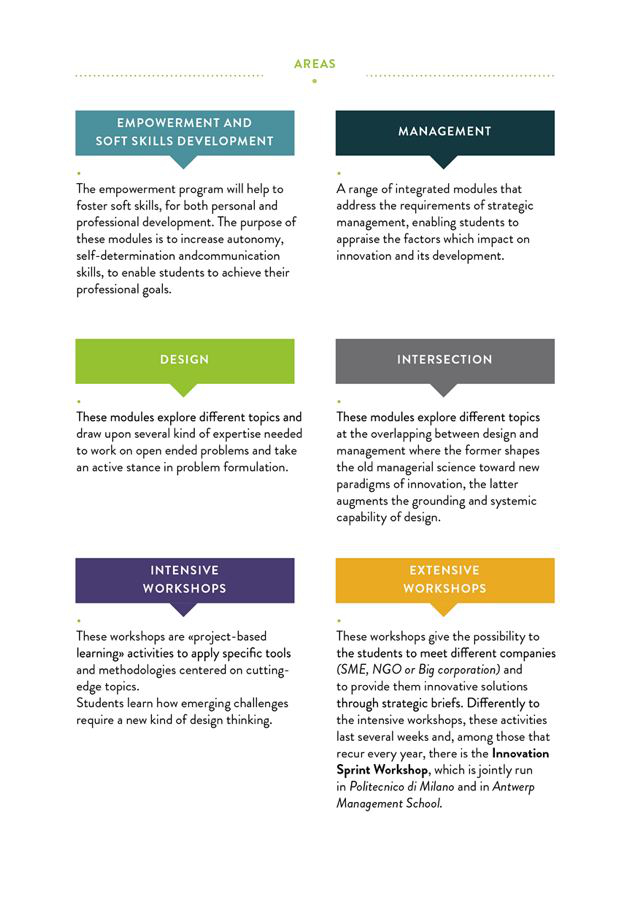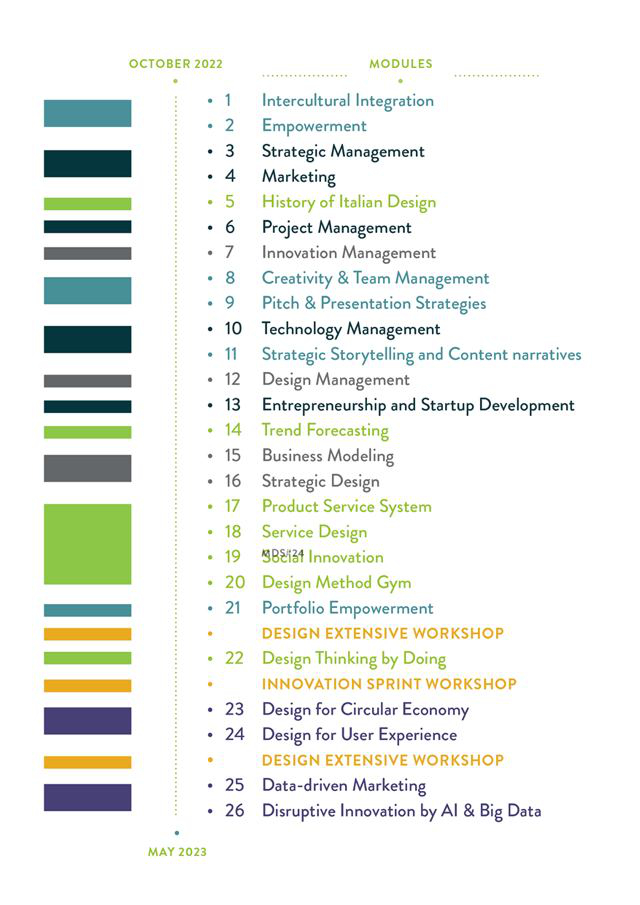

DESIGN AREA
These modules explore different topics and draw upon several kind of expertise needed to work on open ended problems and take an active stance in problem formulation.
Trend Forecasting
A research method which belongs to the family of market research methodologies. It is aimed at investigating: the Social change by focusing on the behaviors of trend setters, lead users and creative communities, the New lifestyles and innovative aesthetic languages and emerging consumer trends and innovative customer experiences.
History of Italian Design
A complete overview of the cultural roots of Italian design showing how different traits are nowadays current and updated (spirit of entrepreneurship, the innovation as a cultural act, the product innovation related to the change of meaning, the observation of user-context).
Product Service System
A deep investigation on how design becomes strategic tying the brand identity with the product features and the distributive strategy.
Service Design
The modules transfer the design tools related to development and the innovation of a service. A deep attention is dedicated to the service ‘tangibilization’.
Social Innovation
The notions of holistic design, radical and systemic change, sustainability, service logic, functional economy, efficiency and sufficiency will be introduced and discussed with regards to the elements characterising a Product Service System.
Design Thinking by Doing
This module is designed to show how to learn, play and experiment with the skills of a design thinker: Empathy, meaning, symphony, play, story and design. You will play with different tools and experience the power of human centered design, iteration, thinking with your hands and giving and receiving feedback.
Design Method Gym
A Design Method Gym is a practical learning experience, rooted in discipline, which accelerates the paths of interpretation and development of the design briefs, data, intuitions technological, semantic and human resources that each design path uses.
MANAGEMENT AREA
A range of integrated modules that address the requirements of strategic management, enabling students to appraise the factors which impact on innovation and its development.
Strategic Management
The present module is designed to provide students with a basic understanding of the concepts of strategy, strategic decision, strategic innovation and disruptive innovation and to illustrate how they are connected with competitive advantage and value creation in companies.
Marketing
The present modules transfer the main concepts about the marketing process, marketing organization and marketing analytical tools. A particular attention is dedicated to the 4P orchestration and to the innovation perspective based on marketing paradigm.
Technology Management
The present modules transfer the concept of technology adoption as a source of competitive advantage. A specific attention is dedicated to technology driven competition, and to the concepts of complementary assets and network externalities.
Project Management
The present modules transfer the basics related to project management as a process of resource allocation and goal setting. Specific attention is dedicated to the differences of project management in big and medium companies and in environments characterized by low or high innovation pace.
Entrepreneurship and Startup Development
The present modules transfer the concepts related to the roots of entrepreneurial activity, the personal traits of entrepreneur, the startup genesis, the lean start up.
INTERSECTION AREA
These modules explore different topics at the overlapping between design and management where the former shapes the old managerial science toward new paradigms of innovation, the latter augments the grounding and systemic capability of design.
Innovation Management
Innovation is a way to achieve a competitive advantage. Specifically great attention is addressed to the barriers to innovate, to the set of advantages/disadvantages pertaining innovation, and to closed/open innovation paradigms. A specific focus is centered on Design-Driven innovation.
Strategic Design
These modules explore different design related topics and draw upon several kind of expertise needed to work on open ended problems and take an active stance in problem formulation and strategic proposition.
Design Management
Focusing on the engaging and the management of the array of designers. Specifically the modules show the main tradeoffs related to divergent design management options.
Business Modeling
The course leverages extensively on activity-based learning method, where students will directly experience business model design and innovation process by taking both perspectives of a startup – looking for a business model – and incumbent company – in need of business model renewal.
DESIGN INTENSIVE WORKSHOP
These workshops are «project-based learning» activities to apply specific tools and methodologies centered on cutting-edge topics. Students learn how emerging challenges require a new kind of design thinking.
Disruptive Innovation in AI & Big Data
The workshop is designed to discover how AI can improve efficiencies, provide customer insights, and generate new product ideas, to develop a deep and jargon-free understanding of AI and machine learning concepts and to gain exposure to applications across functional areas by learning about trends emerging from the rise of frontier tech.
Design for Circular Economy
The circular economy is a new economic system that the European Community embraced, aimed at eliminating waste and promoting the continual use of resources in a virtually endless cycle. During this workshop students will understand how to change the designer’s mindset to work within planet’s boundaries.
Design for User Experience
Theory and practice are combined during the course in order to clarify the core focus and value of UX design in the market, how it’s applied in the development and execution of product and service ideas and its relationship with other roles and disciplines.
Data-driven Marketing
Students will be trained to identify the role of data in improving the different marketing activities: analysis and prediction of demand, segmentation and targeting of the customer base, definition of customer relationship policies, management of experiences, enforcement of commercial and communication plans.

